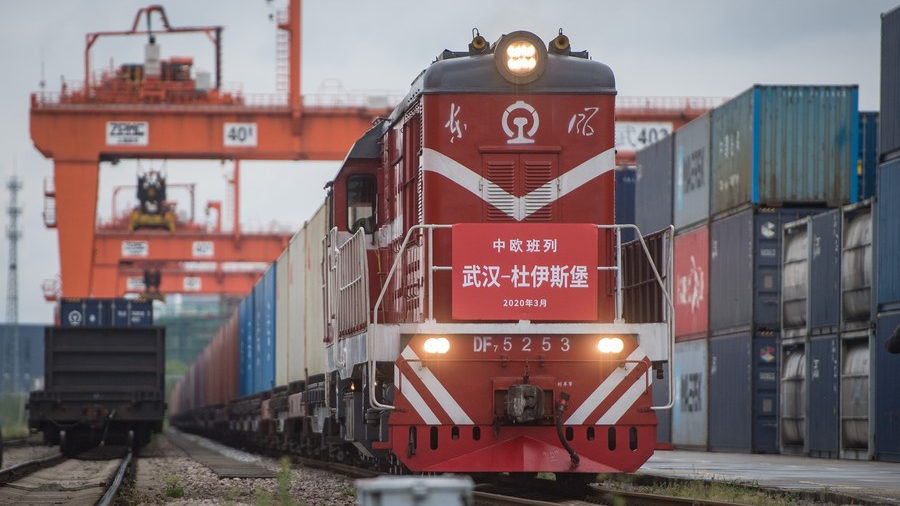
The new Tiexi plant of BMW Brilliance Automotive (BBA) being built in Shenyang, northeast China's Liaoning Province. /Xinhua
The new Tiexi plant of BMW Brilliance Automotive (BBA) being built in Shenyang, northeast China's Liaoning Province. /Xinhua
Editor's note: Azhar Azam is a market and business analyst who writes about geopolitical issues and regional conflicts. The article reflects the author's opinions and not necessarily those of CGTN.
Protecting national interests and maintaining good relations with all states of the world to advance the country's economy is Germany's legitimate right as a sovereign nation. Berlin's objective and neutral approach in international dealings or crises such as in Ukraine should neither be questioned nor inequitably linked with a decline in reputation.
Despite mounting pressure on Germany to downgrade diplomatic ties and take a harder stance on China, former German Chancellor Angela Merkel obstinately refused to intervene in Chinese internal affairs and advocated building on a close and cordial economic relationship by sticking to the idea of convergence. During her 16-year tenure, the "Mutti" (mummy) and trained scientist traveled to Beijing a record 12 times and took a keen interest in forging business and technological ties with China.
2022 marks the 50th anniversary of the China-Germany diplomatic relationship. Since the establishment of diplomatic relations in 1972, the multifaceted Beijing-Germany bonds have been augmented through regular dialogue mechanisms on trade, investment and cooperation in the areas of environment, culture and scientific sectors.
Beijing was Berlin's largest trading partner in 2020 and it is likely to retain its position in 2021 for the sixth consecutive time. The deepened economic draws are creating a snowball effect on people-to-people exchanges and the broader political relationship as the Chinese population in Germany has doubled over the last 10 years and the new German Chancellor Olaf Scholz is committed to preserving the legacy of the "Iron Lady" Merkel who evaded taking a tougher line in diplomacy.
Scholz places a premium on sustaining close communication and cooperation with China to tackle global challenges like climate change and pandemic and regional affairs such as the Afghanistan crisis and Iran nuclear issue. A brief and concise German readout of the telephonic conversation between Chinese President Xi Jinping and Chancellor Scholz in December 2021 described the two major economies had more or less identical views on international crises and were keen to shore up trade and investment relations.

A China-Europe freight train bound for Duisburg of Germany pulls out of the Wuhan terminal of China Railway Intermodal in Wuhan, central China's Hubei Province, March 28, 2020. /Xinhua
A China-Europe freight train bound for Duisburg of Germany pulls out of the Wuhan terminal of China Railway Intermodal in Wuhan, central China's Hubei Province, March 28, 2020. /Xinhua
German leading business leaders expected this constructive alliance to be reinvigorated. Herbert Diess, chairman of the board of management of Volkswagen Group, sought "more cooperation and presence" in China to "use Chinese speed and local technology platforms to remain relevant" in the global New Energy Vehicle (NEV) market. Collaboration and expansion of economic relations would further allow his company to lift its share in the fast-growing Chinese new energy auto market.
Siemens CEO and President Ronald Busch also aspired for a "peaceful exchange" with a country that "has every right to be confident" after pulling one billion people out of poverty and establishing a veritable middle class over the last 20 years. He cited the important role of Chinese solar panels in Germany's energy transition.
In his first formal briefing to the Bundestag, Germany's parliament, Scholz called for multilateralism. During a conversation with Xi later on, he vowed to advance the all-round Sino-German strategic partnership and expressed willingness to work with China to uphold a multilateral world. It's indeed deplorable that a nervous Washington immediately sent threatening signals to Berlin about the return of "bare-knuckled U.S. unilateralism" while mounting unwarranted pressure over the Nord Stream 2 gas pipeline and military expenditure.
Against this backdrop, China and Germany should be mindful of destabilizing activities by the U.S. that aim to unsettle and disintegrate their close bilateral affinity. The two big economies, along with the EU, need to tone down differences and adhere to cooperation, which is crucial to countering much bigger economic, health and security challenges.
It could be disastrous for the rules-based international order and global economy if any of the two countries bow out from the path of mutual trust and respect to "exert influence" or encroach on the other's domestic matters. U.S. President Joe Biden may like Germany to line up behind his perverse foreign policy; Germany would adopt a pragmatic and economy-oriented approach it has already pledged.
The high-level interactions offer an opportunity to buttress the longstanding partnership that began with Merkel's welcoming of the Chinese premier in Berlin to hold the first Chinese-German intergovernmental consultations in June 2011 and strengthen cooperation on resolving international crises, reforming the World Trade Organization and pursuing climate protection, arms control and sustainable development based on United Nations Agenda 2030.
In the sixth government-to-government talks with Chinese Premier Li Keqiang, held virtually in April 2021 due to the pandemic, Merkel reaffirmed China and Germany could play an important role in containing the pandemic by working together. Stressing on the significance of the China-EU investment deal, she represented the agreement as a cornerstone to foster economic relations, mutual market access and reciprocity.
The six declarations of intent and one action plan included joint economic projects, environmental and climate policy and cooperation in science and research, health, food safety, transport, and labor and social affairs. A slew of assurances and Merkel's support for openness and rejection of isolation and protectionism elevated the China-Germany relationship to a new level.
Scholz too rates the relationship highly and has committed himself to the one-China principle. Contrary to the claims that Berlin has no intention to hold bilaterals of cabinet officials at an early date, the chancellor is eager for the next round of intergovernmental consultations to deepen economic and trade cooperation as well as making full use of the "fast track" his predecessor suggested last year to facilitate personnel movement and stabilize global industrial and supply chains.
China-Germany ties are heading down the right direction with a focus on economic growth, tackling global issues and contributing to the peaceful resolution of international crises. The U.S., facing immense domestic challenges, may step up efforts to undermine the relationship. In view of that, China and Germany should ensure no one fouls up their enduring partnership and the world's second- and fourth-largest economies continue to protect their interests and bring stability to international trade.
(If you want to contribute and have specific expertise, please contact us at opinions@cgtn.com.)

